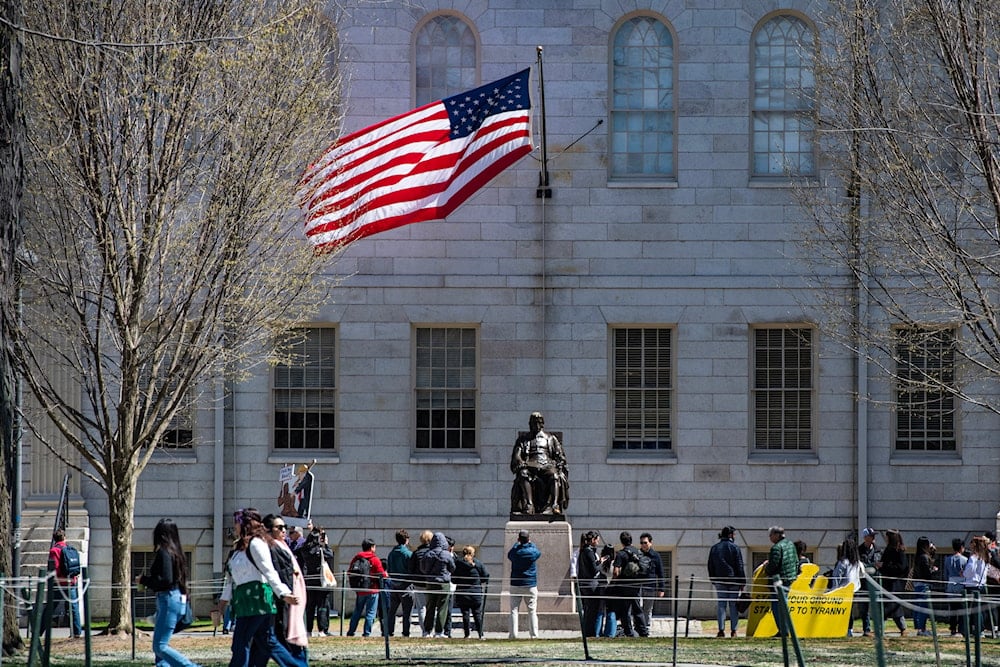China vows to protect international students amid Harvard visa crisis
Beijing defends its students and scholars after the Trump administration bars Harvard from hosting international students.
-

Demonstrators with signs stand around the John Harvard Statue in Harvard Yard following a rally against President Donald Trump’s attacks on Harvard University at Harvard University in Cambridge, Massachusetts, on April 17, 2025 (AFP)
China’s Foreign Ministry has vowed to protect the rights of its overseas students and scholars following a decision by the Trump administration to block Harvard University from enrolling international students, a move that sent shockwaves through global academic circles and drew swift condemnation from Beijing.
Speaking at a regular press briefing, ministry spokesperson Mao Ning warned that the US action would “undoubtedly affect its image and credibility,” while stressing that educational cooperation between the US and China “benefits both parties.”
“The Chinese government will continue safeguarding the legitimate rights and interests of Chinese students and scholars abroad,” Mao said on Friday.
The Department of Homeland Security (DHS) announced Thursday that Harvard University was being stripped of its ability to host foreign students, citing allegations that the Ivy League institution had permitted “anti-American, pro-terrorist agitators” to threaten Jewish students and accusing it of cooperating with the Chinese Communist Party.
The department further claimed that Harvard had “hosted and trained members of a Chinese paramilitary group as recently as 2024,” branding the university a national security risk. As a result, nearly 6,800 foreign students currently enrolled, many of them from China, were ordered to transfer to other institutions or leave the country.
“This means Harvard can no longer enroll foreign students and existing foreign students must transfer or lose their legal status,” DHS said in its statement.
Beijing warns of consequences as education ties fray
Beijing’s strong response signals the growing fragility of academic cooperation between the world’s two largest economies, once seen as a channel for diplomacy. The latest move follows a wave of restrictive US visa policies, surveillance of foreign scholars, and pressure campaigns on American universities.
China’s warning came amid growing fears that the Trump administration is weaponizing immigration policy to target institutions critical of its agenda, particularly those linked to anti-war protests or legal challenges. Harvard has been under pressure since it sued the administration over funding cuts earlier this year, becoming the first US university to do so.
Foreign students, institutions face uncertainty
The announcement marked a new escalation in a campaign against international students. Universities nationwide are already reeling from rising visa denial rates, which jumped from 15% a decade ago to over 40% last year, and bureaucratic barriers that have caused 14% fewer student visas to be issued this year alone.
Analysts warn that the policy shift could accelerate a steep drop in foreign enrollment, which had already fallen 13% among graduate students this spring. At Harvard, international students make up nearly 27% of the student body, the majority of them self-funded and contributing significantly to university finances.
Across the US, more than 1 million international students generate nearly $44 billion in economic activity annually. Nearly 80% of undergraduates from abroad pay full tuition out of pocket, a lifeline for research institutions amid budget cuts and inflation.
Advocates warn of lasting damage to US higher education
Education leaders say the administration’s efforts to punish Harvard by targeting its foreign students are dangerously shortsighted. “International students are not bargaining chips, they are scholars, researchers and contributors to our communities,” said Fanta Aw, CEO of NAFSA, Association of International Educators.
Chris Glass, a professor at Boston College, noted that in past moments of tension, such as the 2017 Muslim ban, universities mounted campaigns of support for international students. “None of that is happening now,” he said. “Instead, the government is using extraordinary power without precedent.”
As universities scramble to protect their international students, offering dual enrollment options, immigration legal assistance, and advising against travel, China has made clear it will not remain silent.
“We turn global talent away at our own expense,” Aw warned. “Other countries are waiting with open arms.”

 4 Min Read
4 Min Read







